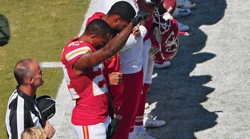Colin Kaepernick is a legend for sacrificing his career in continuing to kneel during the National Anthem, as some other NFL players may believe.
For others, Kaepernick is a disrespectful you-know-what. What first began as ‘just’ sitting through the anthem has transformed into a nationwide phenomenon.
This movement started with Kaepernick’s decision to protest the police brutality and oppression that society sees in the news so often.
In an interview with the NFL, Kaepernick said, “I am not going to stand up to show pride in a flag for a country that oppresses black people and people of color. To me, this is bigger than football.”
While he has every right to defend what he believes in, there are also other ways to do so.
His decision to kneel during the National Anthem, according to President Donald Trump, is not only disrespecting the anthem, but disrespecting the American flag and the United States.
When asked about the controversial issue, several students preferred not to state their stance on it.
Stuart Faunce, a senior health and physical education student, believes that the nation should focus on what unites us. He also believes that binding together during these moments are what will bring us together as a nation.
“I just did the Tunnel to Towers Run in New York in honor of the 343 firefighters that lost their lives on 9/11. There were over 30,000 people there from all walks of life. Such a diverse group of people came together to accomplish one goal,” Faunce explained.
Faunce believes that America will become stronger when people come together, not apart, and when the media focuses on the needs of common people. Faunce also believes that if there are more job opportunities, people will succeed, crime will go down and that too will make for a better America. Furthermore, he added that everyone should be respectful and understanding of what others believe in.
Senior communication student Kayla Cardona showed concern about stating her opinion on the issue because of what others may think. “I personally feel like there are bigger concerns we need to worry about other than the NFL players kneeling. There are more pressing matters in the world like the catastrophe that just struck Puerto Rico. It is frustrating that this has become such a major narrative when our concerns should be directed toward helping others,” Cardona said.
In the midst of students having different opinions, or refusing to state their opinion, Eleanor Novek, a professor of communication, said, “Colin Kaepernick was protesting the oppression of African Americans in the U.S. He wasn’t expressing hatred for the country, or the flag, or the military. His action was peaceful and respectful. In fact, it has been endorsed by current and former servicemen, other players, and by some coaches. He was exercising his right to free speech to do what he did. The hubbub surrounding all of this is obscuring the very real basis for his protest.”
Despite the controversy and uproar this has caused, football players have every right to freedom of speech, which is expressed under the First Amendment. Law professor at the University of Georgia told Vox, “The state – that is, the government – cannot punish him for observing the anthem as he chooses, as long as his observation does not intrude improperly into others’ freedom of speech and expression.”
Kneeling during the National Anthem is in no way harmful or disrespectful, as Novek had explained.
Many professional football players, instead of kneeling like Kaepernick, have been joining arms in solidarity with the movement.
While it does shine light on a controversial issue, what is next? Will these football players continue to kneel during the anthem as more minorities fall victim to police brutality and oppression? We rise by lifting others.
IMAGE TAKEN from Sports Illustrated


